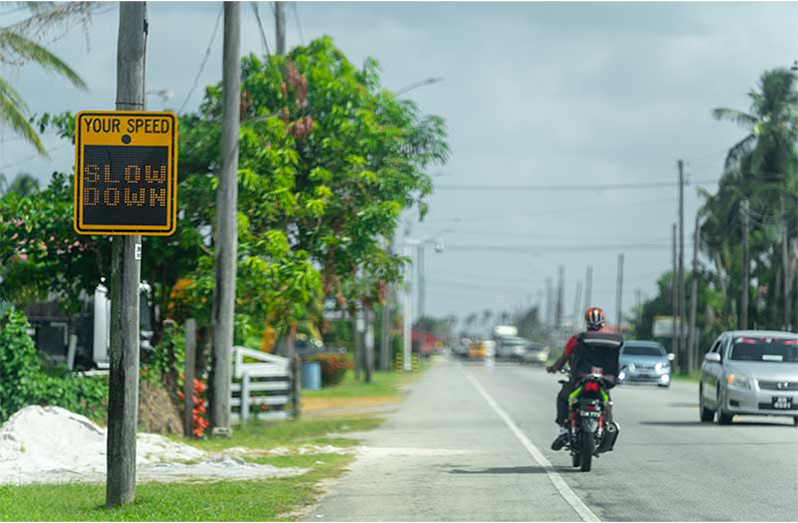–as police prepare to roll out smart meters, cars for better traffic management
SINCE the implementation of Guyana’s automated speed-ticketing system through the Safe Road Intelligent System (SRIS) project in April, some 42,000 tickets have been issued for traffic offences.
This is according to President, Dr Irfaan Ali, who while speaking at a business event earlier this week, urged drivers with outstanding tickets to pay for to do so or risk their vehicular licences being suspended.
Radar speed signs and speed cameras were installed across Guyana to monitor vehicular speeds and traffic patterns.
The automated speed cameras detect vehicles exceeding the speed limit, and tickets will be generated automatically without manual processing.
If a driver’s contact details are registered with the Guyana Revenue Authority (GRA), they will receive a notification via SMS or email with details of the violation. If their contact details are not registered, a physical ticket will be delivered to their address
“We have already have [sic] close to 10,000 persons paying their road tickets electronically and in another few days you will see the offenders published in the newspaper with their outstanding amounts in terms of tickets; and I used this forum to calmly appeal to those who have outstanding payments to do [so] within the next 48 hours or your licences will be suspended,” the President said.
The President noted that the systems put in place are bringing about results and the government will continue to make the necessary investments in these technologies to promote a safer use of the country’s roadways.
To this end, he disclosed that in the coming weeks, the Guyana Police Force (GPF) will be acquiring new speed meters and smart vehicles to enhance its efforts.
“Our police cars and police ranks will be equipped with smart meters and smart cars …so that electronically everything will be recorded and stored, removing that human interface and allowing technology to help people to do better because we have it in us to do better,” he added.
The President had previously stated that the automated speed-enforcement system, combined with real-time traffic monitoring, represents a critical step forward in ensuring compliance with traffic laws, reducing accidents, and ultimately saving lives.
This system is fully automated and autonomous, ensuring impartial and consistent enforcement. No manual intervention is possible, making it impossible for offenders to manipulate or bypass fines. All violations must either be paid for or contested in court.
In January, data gathered through the use of newly established traffic cameras and the installation of new radar speed signs, provided invaluable insights into the behaviour of road users, particularly when it comes to speeding.
The data, which was collected over the course of several days, revealed that between seven per cent and 11 per cent of road users are exceeding speed limits during peak hours.
Last year, the government began the installation of smart cameras along several major highways across the country, which have captured more than 60,000 instances of drivers speeding.
More recently, the GPF and the NDMA began installing new radar speed signs connected to advanced cloud infrastructure as part of the SRIS Project.
The signs are designed to monitor vehicular speeds and traffic patterns, and the data generated from these signs will be used to implement strategies aimed at reducing speeds and improving road safety across Guyana.



.jpg)









